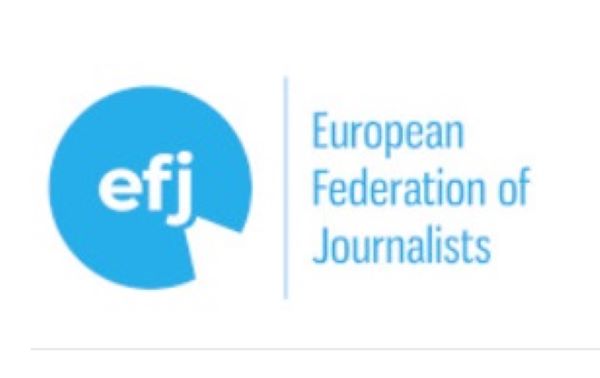Building trust in the digital age: EFJ conference unites stakeholders on media regulation and self-regulation
On Monday 14th October, the media community reached a consensus on the need for multi-stakeholder dialogue as countries implement recent EU media legislations at the EFJ high-level European conference on Self-Regulation and Regulation in the Media Sector.
Over 90 people attended the conference as ULB hosted media regulators, self-regulators, journalists’ professional representatives, publishers’ professional representatives, ULB Masters of Journalism students, EU policymakers, researchers and civil society for the one-day event to discuss media regulation and its impact on journalists and citizens.
“This conference is about the importance of the self-regulation system but also about how such a system can only function with the trust and engagement of the public, all citizens, and all age groups. To build or regain trust, we journalists must engage in dialogue with the audience and the public. Building dialogue and trust in the media is particularly crucial in the fight against disinformation.” – Maja Sever, EFJ President.
ULB students raised concerns on the importance of diversity in the newsrooms, pointing out to the media experts present that the news media cannot reach a diverse audience without championing representation of marginalised groups itself. They also commented on how young journalists enter the labour market already anticipating poor working conditions in most European countries.
The conversation on trust in journalism and digital news media focused on the ethical use of Artificial Intelligence (AI) in newsrooms. The use of AI needs to be regulated accordingly, so as to empower journalists to be quicker, more efficient and more innovative, rather than substituting for their absence. That’s why media and press councils have introduced codes and guidelines on AI. The debate also focused on the necessity for an ethical code of practice for news influencers.
“The EFJ is advocating for stronger regulations in the AI domain, particularly regarding copyrights. This conference is the proof of the consensus on this topic in the media sector: journalists and publishers need the EU to protect intellectual property. The disparities observed in Europe, both in terms of practice and perception, demonstrate the crucial need for AI training in addition to the regulations.” – Renate Schroeder, EFJ Director.
Iva Nenadic, Research Fellow at the Centre for Media Pluralism and Media Freedom (CMPF), gave a workshop on the Digital Services Act (DSA) and the European Media Freedom Act (EMFA) in the framework of media and large online platforms. She explained the need to consider the EMFA and the DSA together when discussing content moderation and also addressed the question of systematic risks to media freedom, which are mentioned in the DSA in articles 14(4), 34, and 35. She presented the delicate balance that media content must respect between providing plurality to the audience and economic stability to the advertisers.
The more experienced journalists and media experts in the room noted how young people do not read newspapers, as they are used to. “With the rise of digital media, there has been a huge crisis in trust in the media and disinformation,” said Adeline Hulin, Chief of Unit for Media and Information Literacy and Digital competencies at UNESCO. She explained their work of setting up school curriculum around Europe on this topic and their engagement with youth organisations to get their commitment on media literacy.
“We’ve used the results of the Media Councils in the Digital Age project in our impact assessment. We need to open a channel of communication to start working with self-regulators and put a system of self-regulation in place in all EU countries. This will also require the help of regulators, and will be an important thing to follow up from this event.” – Anna Herold, European Commission Head of the ‘Audiovisual & Media Services Policy’ unit of the Directorate General for Communications Networks, Content and Technology (DG CONNECT).
The European Regulators Group for Audiovisual Media (ERGA) Chair for the sub-group on the EMFA Frederic Bokobza explained that the group’s priorities include working with press and journalists and combating media market concentration. Herold stated that the European Commission’s priority is on media as part of the rule of law and democracy and also media innovation.
The day concluded with self-regulators and regulators agreeing that they share a common goal: to work towards fostering a media landscape that upholds ethical and legal standards that are in line with the rule of law and European democratic values.
“We are now looking to the grey zone of new media legislation [with regards to the European Media Freedom Act and the Digital Services Act]. Part of this process will be achieving a new level of cooperation between regulators and self-regulators.” – Carlos Aguilar Paredes, Vice-President of ERGA.
Drawing on the latest research on the evolving role of European self-regulatory bodies, ULB researcher Simone Benazzo delivered a workshop on Strategic Lawsuits Against Public Participation (SLAPPs) and self-regulation. He presented SLAPPs as a form of media capture, and engaged attendees to debate the new role of self-regulators in instances of media capture.
In his closing remarks, ULB Master of Journalism Coordinator David Domingo expressed the importance of having the right legislation tools that empower the journalists and the press. While these still need time to take shape, he commented that media and journalists can already focus on being transparent and uphold ethical standards to build trust with their audiences. They also have a responsibility to represent the diversity of society, opening newsrooms to workers of all ages, genders and cultural backgrounds. |
